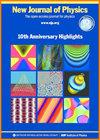基于测量的量子计算在物理驱动的变分量子求解器中的适用性
IF 2.8
2区 物理与天体物理
Q2 PHYSICS, MULTIDISCIPLINARY
引用次数: 0
摘要
变分量子算法被认为是获得近期量子优势的最有前途的方法之一;然而,这些算法大多只能用传统量子电路方案来表达。使用基于测量的量子计算(MBQC)方案开发量子算法的障碍是资源成本。最近,我们发现使用 MBQC 方案实现多量子比特旋转操作只需要恒定数量的单量子比特测量,这在资源成本方面提供了潜在优势。哈密顿变分方程的结构与这一特点非常吻合。因此,我们为量子多体系统模拟任务提出了一种高效的基于测量的量子算法,称为基于测量的哈密顿变分解析式(MBHVA)。然后,我们用二维海森堡模型和费米-哈伯德链证明了它的有效性、效率和优势。数值实验表明,MBHVA 与基于电路的变分法性能相似,与量子电路相比,有望减少执行过程中的操作次数,带来运行时间上的优势。我们的结论是,MBQC 方案对于在嘈杂的中尺度量子时代实现近期量子优势具有潜在的可行性,尤其是在存在大量多量子比特旋转操作的情况下。本文章由计算机程序翻译,如有差异,请以英文原文为准。
Applicability of measurement-based quantum computation towards physically-driven variational quantum eigensolver
Variational quantum algorithms are considered one of the most promising methods for obtaining near-term quantum advantages; however, most of these algorithms are only expressed in the conventional quantum circuit scheme. The roadblock to developing quantum algorithms with the measurement-based quantum computation (MBQC) scheme is resource cost. Recently, we discovered that the realization of multi-qubit rotation operations only requires a constant number of single-qubit measurements with the MBQC scheme, providing a potential advantage in terms of resource cost. The structure of the Hamiltonian variational ansatz aligns well with this characteristic. Thus, we propose an efficient measurement-based quantum algorithm for quantum many-body system simulation tasks, called measurement-based Hamiltonian variational ansatz (MBHVA). We then demonstrate its effectiveness, efficiency, and advantages with the two-dimensional Heisenberg model and the Fermi–Hubbard chain. Numerical experiments show that MBHVA can have similar performance as circuit-based ansatz, and is expected to reduce operation counts during execution compared to quantum circuits, bringing the advantage of running time. We conclude that the MBQC scheme is potentially feasible for achieving near-term quantum advantages in the noisy intermediate-scale quantum era, especially in the presence of large multi-qubit rotation operations.
求助全文
通过发布文献求助,成功后即可免费获取论文全文。
去求助
来源期刊

New Journal of Physics
物理-物理:综合
CiteScore
6.20
自引率
3.00%
发文量
504
审稿时长
3.1 months
期刊介绍:
New Journal of Physics publishes across the whole of physics, encompassing pure, applied, theoretical and experimental research, as well as interdisciplinary topics where physics forms the central theme. All content is permanently free to read and the journal is funded by an article publication charge.
 求助内容:
求助内容: 应助结果提醒方式:
应助结果提醒方式:


